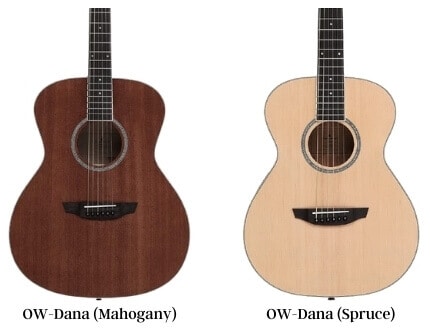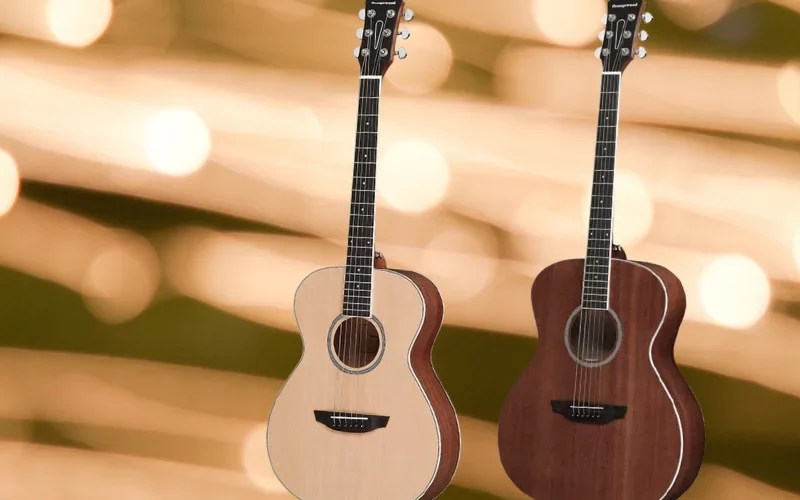Shopping for a budget travel guitar? In today’s Orangewood Dana review, we are going to have a look at Dana – an inexpensive mini-concert acoustic guitar from Orangewood.
In the review, we’ll have a look at what makes Orangewood Dana a great choice for beginners and those who want to be able to carry their guitars around on travel. We’ll also have a brief look at the Orangewood brand as a whole.
Orangewood Dana Guitar Review: Features
Affordable Price
First up, Orangewood Dana is super-inexpensive for what it offers. This mini travel guitar is very pocket-friendly and is great for beginners.
Needless to say, the quality of the components reflects the price of this guitar – if you’ve ever played a high-end acoustic guitar, you’ll notice that this instrument isn’t as well-built or polished.
However, for the price, the quality is excellent, and Dana certainly doesn’t feel like it’s going to collapse after one tough session.
Compact Design
The highlight and the primary reason for buying Orangewood Dana is its super-compact mini design. Dana is a great choice for a travel guitar since it’s much more compact (3/4 size guitar) than concert-style acoustic guitars that this instrument is modeled after.
The materials in the Orangewood Dana mini travel guitar are nice but nothing exceptional – the body is entirely made of layered mahogany, the neck of standard mahogany, while the fretboard and bridge are made of hybrid wood.
There is also a spruce variant – the only difference here is that the top is layered spruce. The spruce is going to make the overall sound of the guitar lighter and smoother.
In contrast, if you like a more punchy sound, then the mahogany variant would be a better choice.

The wood in Dana isn’t solid, so the guitar isn’t going to mature and deliver better sound as you play it. Not only that, but due to the smaller size, the guitar is going to deliver a less full sound, but that’s inherent to any mini guitar.
Interested in a compact travel guitar? Check out our Washburn Rover Review articles.
Out-Of-The-Box Setup
What’s also very nice about Orangewood Dana is that it comes fully set up and tuned out of the box. Orangewood instruments get professionally set up in Los Angeles before shipping, so there is minimal work you need to do to get started with Dana.
With that said, the hardships of shipping often knock guitars out of tune. Although most past buyers have been pleased with the minimum setup requirements of the Dana guitar, be ready to do some initial tuning because shipping doesn’t always go smoothly.
High-Quality Gig Bag & Optional Accessory Pack
For the price, you’re also getting an amazing gig bag. It has really good quality and certainly won’t be falling apart any time soon after purchase. With that said, it’s only good for keeping dust away from your guitar – there is little to no padding in it for protection.
Aside from the gig bag, Dana comes with a pickguard and adjustment tools.
Optionally, you may also get Dana with an accessory pack. The accessory pack includes a few useful items such as a tuner, strap, guitar picks, a string winder, a chord chart, a polishing cloth, and a capo.
The quality of these accessories is fairly nice, though if you were to buy them separately, you would probably be able to get better craftsmanship and durability.
Orangewood Dana Review: FAQ
Are Orangewood guitars any good?
Yes, Orangewood guitars do appear to be very good. The brand all in all seems to be more focused on lower-end guitars, so Orangewood instruments are great for beginners. Buyer online feedback generally is extremely positive, so you should have no issues with this brand.
Where are Orangewood guitars made?
Orangewood guitars appear to be made in Indonesia, but they are professionally set up in Los Angeles, California before being shipped.
Who owns Orangewood guitars?
Orangewood is owned and was founded by brothers Eddie and Sooj Park. The original idea behind the brand was to offer quality at an affordable price. Aside from that, Orangewood pursues a direct-to-consumer approach and offers excellent customer support.
Check this video review of Dana Mini (Spruce Version) :

Conclusion
All in all, Orangewood Dana is a great option if you don’t have much money to spare on a travel guitar or you are looking for a small size guitar for your kid. Dana is very inexpensive, and remarkably, it delivers excellent quality for the buck.
Even if you are a super-experienced guitarist, you will most likely be impressed by what Dana has to offer at its price point.
What we especially like about the Dana mini travel guitar is the quality of the included accessories. At the price of Dana, you usually get subpar bags, picks, and other items – here, the quality of accessories isn’t stellar, but it’s much better than what we’d expect for the price.
In the end, strongly consider Orangewood Dana if you are on a budget, but before finally making a decision, have a good look at other options as well.



